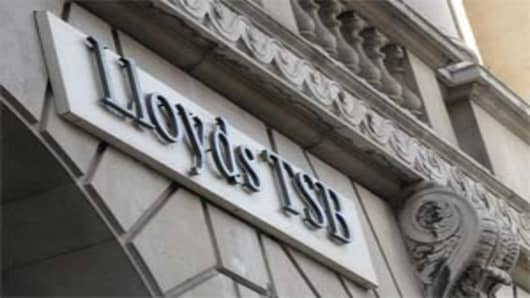Lloyds shares had lost ground this week as the market feared an order from Europe's anti-trust regulators for Dutch bancassurer ING to break up its business after receiving state aid set a harsh precedent for the British bank.
"I think the comments today provide comfort that the group will not be broken up and that any restructuring initiatives will not be particularly material to group earnings or capital," said Joe Dickerson, UK banks analyst at brokerage Execution.
In reference to its talks with Brussels, the bank said: "(Lloyds) is confident that the final terms of its restructuring plan, including any required divestments of assets, will not have a material impact on the group." Its comments came as Ireland's finance minister sought to downplay worries about a delay to his 54 billion euro bad bank plan, saying it could still proceed on schedule unless parliament gets bogged down in a lengthy debate.
Final Details
Sources familiar with the matter on Thursday gave new details of Lloyd's campaign to stay out of the APS.
It has lined up a mandatory convertible bond of 2 billion pounds and a series of actions agreed with the Financial Services Authority, they said, such as cost cuts and a reduction of risk-weighted assets.
It also plans a rights issue of 12 billion pounds and contingent capital -- "top up" hybrid capital that changes into equity if the bank hits trouble -- of 7 billion pounds, bringing the total to well over 21 billion pounds.
Lloyds declined to comment.
The bank has yet to receive the green light from regulators to stay out of the APS plan and absorb any further losses on toxic assets without state aid.
It said in March it wanted to insure 260 billion pounds worth of assets under the scheme.
"There can be no certainty at this stage that any alternative to (the government insurance scheme) will proceed. All options remain open," Lloyds said.
A Treasury official likewise said talks with Lloyds were continuing and no decisions had been made.
Sources close to the situation have said Lloyds hopes to launch its plans next week, if it gets approval.
That would enable it to raise the money before Christmas, its preferred time schedule.
A further delay would increase the risk that markets turn sour.
The Treasury has given Lloyds the go-ahead to explore market sentiment and reassure it that private investors are willing to bear the risk of its massive capital addition, two sources familiar with the matter said on Thursday.
"They have been given the go-ahead (to find out) whether they can get it done and underwriters need to explore whether they can deliver," one of the sources said.
"The government is conscious of the risk and if they believe it's too high they won't give them the go-ahead ... the second gets answered by the first," the source said.
The bank has yet to officially mandate the banks it has lined up for the rights issue: UBS, Bank of America Merrill Lynch, Citigroup, Goldman Sachs, JP Morgan Cazenove and HSBC .
Markets have been bracing for wild swings in Lloyds's share price, with stock lending -- an often-used indicator for short-selling -- rising sharply this month.


